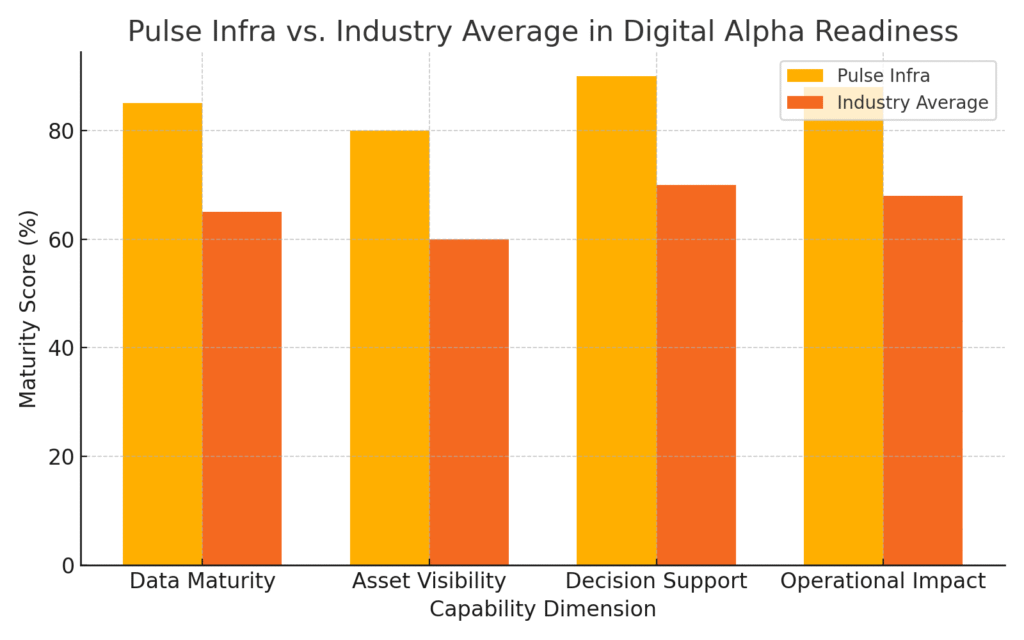A Blueprint for DataDriven Operational Excellence
Executive Summary
Achieving operational excellence in asset-intensive sectors has long been challenged by ageing infrastructure, siloed data, and reactive maintenance cultures. While digital tools and sensors abound, very few organisations have captured the full promise of their investments. Pulse Infra’s Digital Alpha Blueprint addresses this gap. By aligning asset management strategy with data governance, predictive analytics, and field execution, Pulse enables organisations to move beyond pilots and achieve systemic value from digital transformation. This whitepaper provides a framework for achieving Digital Alpha—defined as a measurable performance uplift derived from strategic digital asset management—and outlines how leading organisations are doing it today.
The Urgency for Change
With global infrastructure demands rising and public expectations for reliability, resilience, and sustainability growing, asset-intensive organisations face unprecedented pressure to modernise their operations. The challenge lies not in acquiring new tools, but in uniting disparate systems, breaking through decision silos, and embedding data into the DNA of operational planning. According to ISO 55001, effective asset management is contingent on the integration of data, risk, performance, and cost throughout the asset lifecycle.
What Is Digital Alpha in Asset Management?
Digital Alpha is the outcome when digital interventions deliver sustained improvements in asset cost, risk, and performance. It combines advanced analytics, real-time sensing, and human-machine collaboration to enable proactive decision-making. Rather than acting on lagging indicators, operators use predictive insights to drive capital and maintenance strategies—shifting from reactive firefighting to forward-looking stewardship.

Figure 1: Pulse Infra’s Digital Alpha readiness scores outperform industry average across core dimensions.
Why Most Digital AM Initiatives Fail
Despite heavy investments in sensors, dashboards, and enterprise systems, many asset-intensive firms struggle to realise ROI from digital projects. Common barriers include:
– Misaligned strategy and technology implementation
– Poor data quality and fragmented data ownership
– Focus on tools rather than value outcomes
– Lack of change management and operational buy-in
Pulse Infra’s Digital Alpha Blueprint
Pulse Infra delivers digital asset transformation using a four-part model:
1. Strategic Asset Data Governance: Aligning taxonomy, ownership, and purpose across systems
2. Risk-Based Predictive Analytics: AI/ML models to anticipate failure, degradation, and lifecycle costs
3. Embedded Decision Workflows: Integrating outputs into work planning, investment prioritisation, and reporting
4. Capability Building: Uplifting internal teams to sustain insights and scale outcomes
What Global Leaders Are Saying
“Digital transformation in asset management isn’t about technology—it’s about enabling faster, smarter decisions in real time.”
– Andrew McCloskey, Former CTO, Siemens Digital Industries
“ISO 55001 is the global baseline, but true value comes when data becomes a strategic enabler—not just a compliance checkbox.”
– Christine Gonzalez, Chair, Institute of Asset Management (IAM)
Pulse Infra in Action: Global Case Studies
In the GCC, Pulse Infra worked with a major transport authority to consolidate 40,000+ asset records from legacy systems, applying predictive models to optimise risk-based maintenance. Results: 22% reduction in lifecycle costs and improved audit outcomes.
In APAC, Pulse supported a national utility by integrating condition data into asset investment planning. This enabled the client to re-prioritise $600M in capital spend based on value and risk, not just age.
How to Begin the Digital Alpha Journey
Executives must define their Digital Alpha ambition early—identifying measurable outcomes aligned to asset strategy. Next, prioritise high-value use cases (e.g., failure reduction, regulatory performance, carbon optimisation). Build a cross-functional delivery team, secure leadership sponsorship, and partner with implementers like Pulse Infra who understand how to scale.
Conclusion: From Aspiration to Advantage
Digital Alpha is not a vision statement—it’s a measurable shift in how organisations manage critical infrastructure. Through implementation-focused delivery, Pulse Infra helps clients achieve performance resilience, risk transparency, and cost efficiency. This paper is the first step. Let’s build the future of infrastructure, together.
